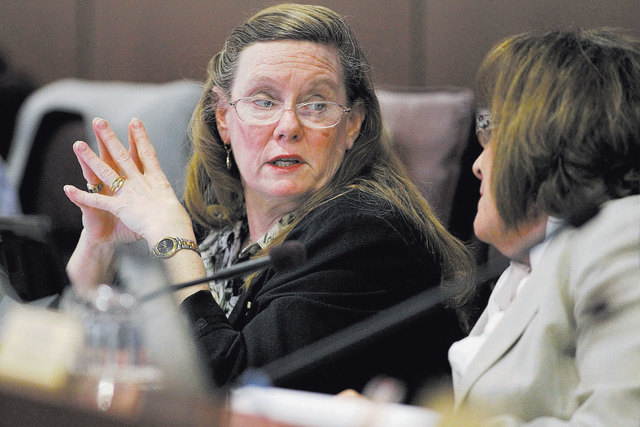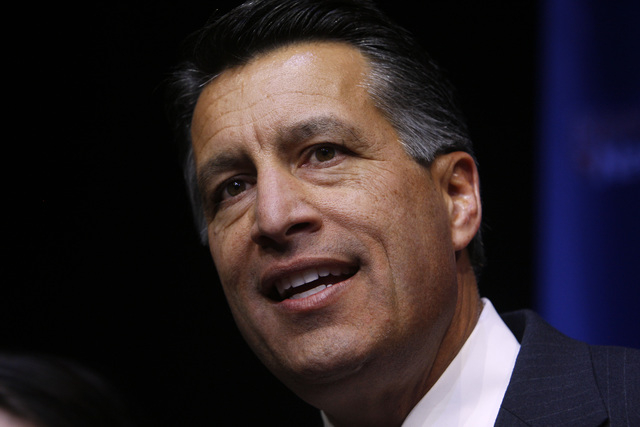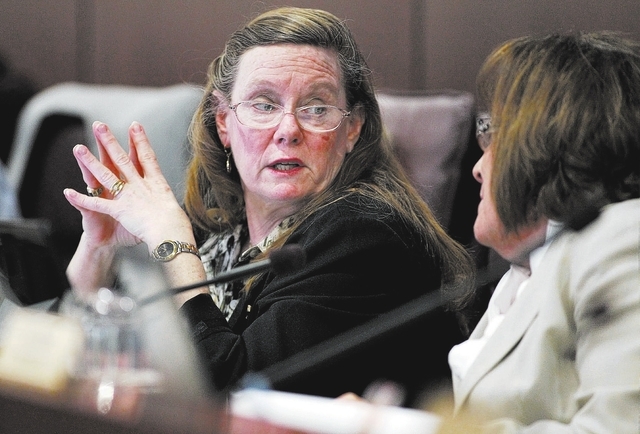Abortion issue returning to Nevada Legislature in 2015



A Nevada law on the books for 30 years requires girls younger than 18 to tell at least one of their parents before getting an abortion, but it’s never been enforced because of a successful legal challenge.
Now, with the Republican takeover of both houses of the Nevada Legislature, fueled by an influx of fresh-faced conservatives, anti-abortion advocates say they’re going to take another run at reviving the statute.
“One of our highest priorities has been the parental notification law,” Melissa Clement, president of Nevada Right to Life, said. “We’ve always played defense because there hasn’t been enough (anti-abortion) lawmakers in the Legislature to get anything done. Now, we can play offense again.”
On the other side, a veteran Democratic lawmaker, Assemblywoman Maggie Carlton of Las Vegas, said she’s prepared to fight the effort. She anticipated there will be many more battles during the upcoming 2015 session between progressives and conservatives who have spent years in the minority, unable to even get a committee vote on some measures.
Carlton also plans to introduce a bill to prevent companies from citing religious grounds in refusing to provide contraception to workers covered by health insurance plans. Her proposed “Employee Reproductive Health Nondiscrimination Act,” or Bill Draft Request 53-148, is in response to the U.S. Supreme Court decision earlier this year in the Hobby Lobby case. The high court allowed closely held, for-profit corporations that have strong religious views to be exempt from President Barack Obama’s health care law that mandates contraception coverage.
“They’re going to pull everything out, things that have been sitting in a folder for 30 years,” Carlton said of Nevada conservatives. “So this doesn’t surprise me at all.”
ABORTION: SETTLED LAW IN NEVADA
Carlton, who served 12 years in the state Senate before being elected to the Assembly for the first time in 2010, said the abortion issue has been settled law in Nevada for decades, primarily because voters in 1990 approved the Freedom of Choice Act.
The ballot initiative upholds a Nevadan’s right to have an abortion even if the U.S. Supreme Court’s 1973 Roe v. Wade decision is overturned. Roe v. Wade essentially affirmed a woman’s right to have an abortion.
Voters would have to rescind the act to reverse Nevada’s law allowing abortions through 24 weeks of pregnancy, although late-term procedures are allowed in cases in which a woman’s life is in danger.
In the case of parental notification, the 1985 law passed the Assembly on a 33-8 vote and the Senate 18-3. It was immediately challenged by Planned Parenthood and a Reno doctor.
In 1991, the 9th U.S. Circuit Court of Appeals found the law unconstitutional in a case known as Glick v. McKay. The attorney general did not challenge the ruling. In 1997, however, the U.S. Supreme Court upheld a similar law in Montana, suggesting that Nevada’s parental consent statute might be upheld as well by the high court.
The Nevada law provided a judicial bypass provision, allowing a girl to seek a judge’s approval to get an abortion if she couldn’t go to her parents, but it wasn’t an adequate or easy process, according to people familiar with the ruling.
In 1995, lawmakers in Nevada tried to repair the parental notification law, but the effort failed.
Any new legislation would have to fix the flaws in the current law, said Nevada Right to Life’s Clement, who has three children, including a 15-year-old daughter and two sons. Clement said she doesn’t understand how a girl can get an abortion without a parent knowing, yet as a mother she must approve other medical procedures.
“She can’t have an aspirin at school without my knowing, but she can get an abortion,” Clement said.
ATTORNEY GENERAL ROLE?
If the Nevada Legislature doesn’t act on the issue, Clement raised the possibility that the Nevada attorney general could seek an administrative fix that might lift the judicial stay on the law.
Or, she said, the attorney general could challenge the 9th Circuit ruling to take the issue to the U.S. Supreme Court.
Adam Laxalt, a conservative Republican, is the incoming attorney general and might be open to such a strategy, but Clement said she hasn’t discussed the issue with him yet.
Assemblywoman Carlton, who has two daughters, now 29 and 30, said some girls might be in danger if they tell one or both of her parents, including in cases where a father might have sexually abused the girl.
“You don’t want to put the minor in harm’s way,” Carlton said, including by letting a girl get a backroom abortion rather than face telling her parents. “You have to think about what happens to the teenager.”
Carlton predicted the Assembly would almost certainly pass a parental notification bill if it reached the floor and there were a party-line vote since there are 25 Republicans now compared with 17 Democrats. But the Senate, she said, is an open question with the GOP holding a slim 11-10 seat advantage over Democrats.
Clement said Nevada Right to Life officials have been talking with lawmakers, both veterans and newcomers, about the issue. But it’s unclear who might introduce a parental notification bill and Clement would not name individuals.
Becky Harris, a Las Vegas attorney and conservative Republican who won a state Senate seat in November, worked on strict abortion legislation in Utah when she was a law clerk from 1990 to 1992. The state imposes a 72-hour waiting period on women seeking an abortion. Utah also recognizes that “unborn children” have an “inherent and inalienable right to life.”
Harris said she has no plans, however, to introduce any abortion-related bills in the upcoming legislative session. Asked if she supports Roe v. Wade and opposes criminalizing abortion, Harris emailed a one-word answer: “Yes.”
CAFFERATA: HIGHER PRIORITIES
Elisa Cafferata, president and CEO of Nevada Advocates for Planned Parenthood, is skeptical that the Legislature will pass any new abortion laws, partly because there are higher priorities such as the economy, jobs and education. Also, many Republicans ran for election touting their support for women’s access to health care.
“I didn’t see anybody running on this,” Cafferata said of abortion restrictions. “It just depends on what they’re going to spend their time and energy on. There’s so much pressure to show you can govern. Changing the law surrounding abortion — a law that’s been around for decades — isn’t going to create jobs anywhere.”
Still, Cafferata noted that hasn’t stopped conservative Republicans in other states who have taken control of state houses and governors’ mansions. In recent years, states have been imposing waiting periods, ultrasound requirements and stricter building codes or hospital admitting rules to limit abortions, according to a Politico story published Friday. In Texas, for example, the state now has 10 abortion clinics, down from 40 such facilities only a year ago.
Some 38 states have parental notification or consent laws, according to the Guttmacher Institute, a nonprofit group close to Planned Parenthood. The law has been temporarily or permanently enjoined in five states, including Nevada.
Republican Gov. Brian Sandoval, who supports abortion rights, might not sign a notification bill if it contains any objectionable provisions, his spokeswoman said, offering no specifics. Another personal factor: the governor has three children, including two school-age daughters, who might weigh on his mind as he makes any decision.
During his first gubernatorial run in 2010, Sandoval expressed support for parental notification on his campaign website, according to “On the Issues,” which tracks politicians’ views.
Sandoval spokeswoman Mari St. Martin said any support depends on the final wording of the legislation.
“A proposed bill is subject to multiple amendments and hearings by the Legislature and often does not make it to the governor’s office for review and consideration,” St. Martin said in an email. “If a bill does make it through the legislative process, it almost always is very different from the original bill. Indeed, some bills are amended to the point that the original sponsor no longer supports the bill.”
“For these reasons, the governor typically does not comment on proposed or pending legislation,” she added. “If a bill is approved by the Legislature, the governor will carefully review and consider it and either sign it, veto it or allow it to become law.”
Contact Laura Myers at lmyers@reviewjournal.com or 702-387-2919. Find her on Twitter: @lmyerslvrj.












